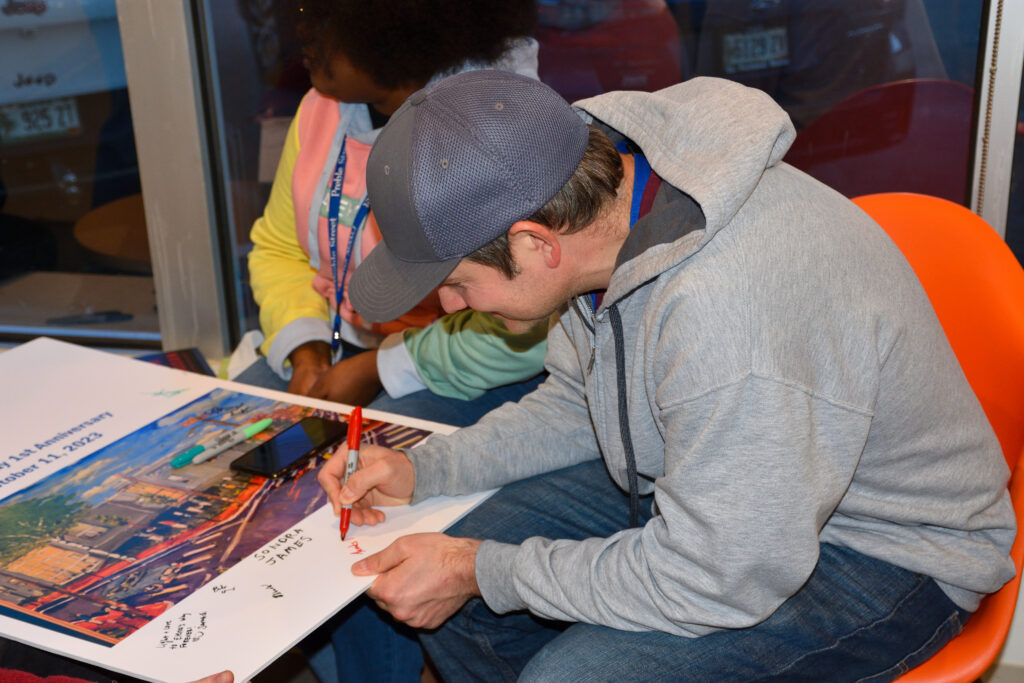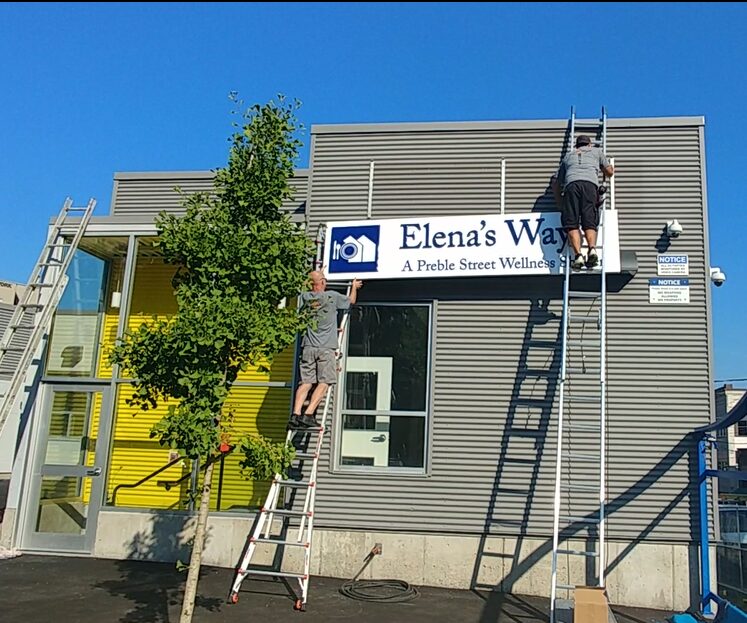March is National Social Work month, and we are sharing some of the experiences of Andrew Bove (he/him), VP of Social Work at Preble Street. Below Andrew reckons with the challenges posed by the opioid epidemic, the COVID-19 pandemic, the housing crisis, and how these things have stressed an already disjointed and dysfunctional health system. He calls for the continued collaboration between community organizations and members toward productive and actionable solutions that create positive impacts for the whole of the community.
Social work has never been for the faint of heart. The ever-worsening opioid epidemic, the housing crisis, and the fractured mental health system have resulted in unprecedented demand for services and made this career even more challenging. Social workers play vital roles in the well-being of our communities – in our schools, hospitals, mental health clinics, senior centers, shelters, prisons, military, and so many other places. Social workers are needed now more than ever – and equally important, social workers need the support of their communities, too.

Andrew at the one-year anniversary of Elena’s Way.
Social work is the foundation of the work that we do at Preble Street to provide low-barrier services to people experiencing homelessness, housing, hunger, and poverty and to advocate for solutions to these problems. Preble Street social work staff are committed to meeting the needs of clients and delivering a high-level of professional service 365 days a year. Our founder, Joe Kreisler, once said that “part of being alive is making sure that other people are too.”
The far-reaching impacts of social work...
The impact of Preble Street’s work goes far beyond the individuals who come through our doors. When we are successful, the entire community benefits. People with housing generate fewer police calls, have fewer trips to the ER, and end up in jail considerably less often than those in shelters or on the street. Housing leads to improvements in an individual’s quality of life – leading to better health outcomes, decreased mental health symptoms, and reductions in the use of substances, not to mention increased reconnections with family, community, and employment.
I’ve worked at Preble Street for more than 15 years. In that time, I’ve been able to provide people with vouchers, apartments, clothes, information, food, and so much more. I’ve provided all these material things, but time and time again, when people tell me what was most important to them, it has been the fact that I listened, looked them in the eye, and was willing to hear their story. This is what matters, and here is where compassion lives. The simple act of bearing witness, without judgement, makes a powerful difference, and we’ve all felt it. If we take care of each other, people can begin to take care of themselves.
Each person’s story is different and the reasons that they became homeless are complex. Social workers help people navigate these difficult situations and try to find solutions. Things like the pandemic, the lack of housing and shelter, and the need for more substance use, mental health, and medical treatment, makes this task even more daunting, and incredibly frustrating.
Coordinating care and connecting people...
To find solutions, social workers have needed to become creative, even entrepreneurial, and work even more collaboratively with a wider variety of teams and disciplines. This winter, by coordinating outreach efforts with the City of Portland’s Homeless Services Center (HSC) team, outreach workers from Preble Street and other partners made considerable progress in helping move people from encampments into shelter. It was inspiring. Despite this incredible effort, though, there are still too many people living unsheltered in Portland and throughout Maine.
The Bayside neighborhood, where Preble Street has been a part of the community for our entire nearly-50-year history and where many other service providers are located, is again at the epicenter of Portland’s unsheltered crisis. It’s hard to watch, and this human suffering takes a toll on all of us. We have made great strides as a community in connecting people to shelter and treatment, and despite these considerable efforts, there are still Portlanders who have been left behind. Left behind because there is no place for them to recover, left behind because the system designed to support them has excluded them, and left behind because there are not enough social workers, mental health counselors, or detox beds to go around. The folks who remain unsheltered in Portland have complex clinical presentations and have fallen through the cracks of every system available — but it doesn’t have to be this way.
A deeper look at Bayside…
The number of people in Bayside dramatically increased after the last sweep. There are 20 or so high needs individuals that have nowhere else to go. Preble Street is emphasizing this need – with the City and other partners – for a coordinated community effort focused on Portland Street, similar to what the community did during the last encampment sweep.
In that spirit, Preble Street has launched a weekly community partner huddle devoted to these 20 most complex cases, in the hopes that community care plans can be developed. So far, the huddles have been very well attended by a variety of our partners, as they are also seeing pressures on their spaces in Bayside and are invested in trying to help address the situation with a united front.
Community problems need community solutions.
We have seen what great things can be accomplished when we work together, and the current homelessness crisis is no different. If there is will, there is a way.
March is Social Work Month and in the face of so many challenges, you might be asking what keeps social workers coming back every day? Maybe it’s the shared laugh with someone on a street corner, or the moments of joy alongside the darkness. The tears I’ve seen carry an ocean’s worth of pain, and still there is hope. There is possibility. Everyone has value and everyone deserves someone to care about them. The good news is that homelessness, hunger, and poverty are solvable. Social work takes effort, and the support of an entire community, but with time, planning, and investment, we will see the results – in our families, our neighborhoods, our cities, and in Maine.
Learn more...

The Importance of Low-Barrier Shelters in Our Community
What does a low-barrier shelter look like? At a time when unsheltered homelessness is increasing exponentially in our community and the shortage of low-barrier shelter beds has created a state-wide crisis, Elena’s Way and Florence House are a model for how we can take care of the most vulnerable people in our community. The staff

Housing People Takes Investment, Not Magic
We have said before that the reasons why people experience homelessness are complex, but the solutions are not. Ensuring that people can access stable and safe housing and maintain that housing is the solution to homelessness. Preble Street created its Rapid Re-Housing program (RRH) in 2020 to move more people from homelessness to permanent housing.

Teen Housing and Outreach: Curbside
18-year-old Austin currently spends his nights at the Preble Street Joe Kreisler Teen Shelter or outside on the streets. “I was emancipated at 16 to get away from my family. I lived with friends for about a year and a half. When I turned 18, their parents were like ‘Ok, time to be an adult,

